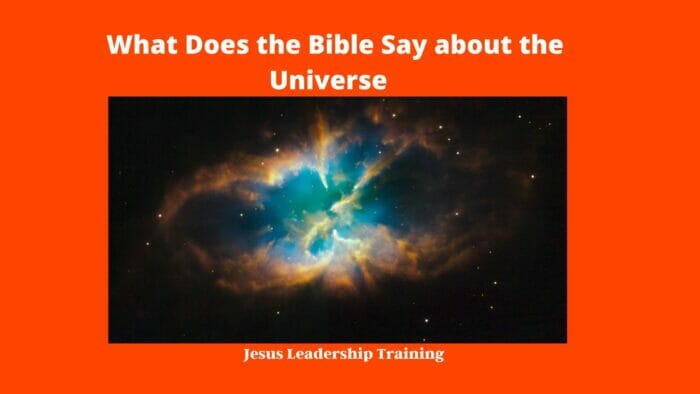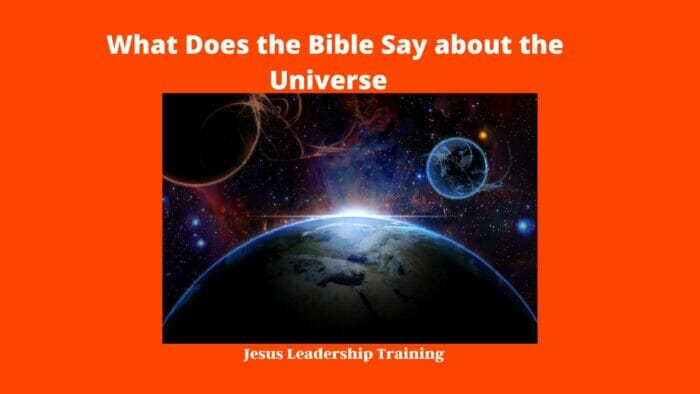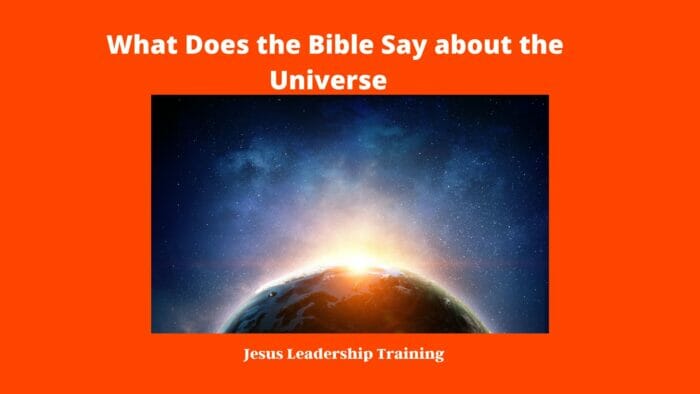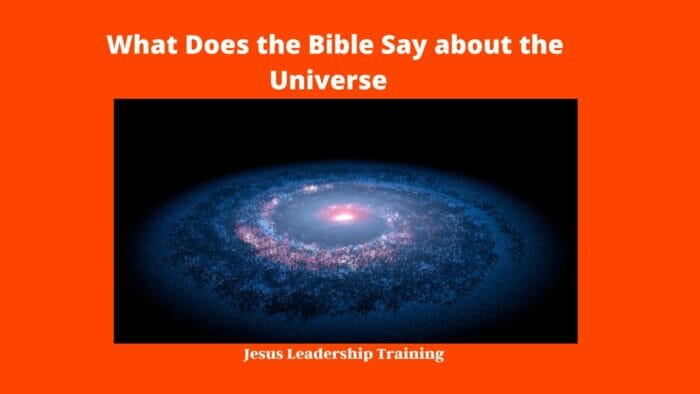What Does the Bible Say about the Universe – The Bible contains an expansive amount of information regarding the universe, and it is often seen as a source of wisdom and guidance. Throughout the Bible, there are several passages that discuss the universe and its many aspects, from its vast size and complexity to its origin and purpose. In particular, the Bible speaks of the universe being created by God and that it is constantly under his watchful eye.
The Bible also speaks of the universe being a place of divine order, with each star and planet in its place, and the laws of nature in operation. Additionally, the Bible speaks of the universe as a place of divine beauty and a source of inspiration and awe. As such, it can be seen as a symbol of God’s power and majesty. In sum, the Bible provides an interesting and insightful perspective on the universe, which can be used to gain an understanding of its significance in the grand scheme of things.
Table of Contents
What Does the Bible Say about the Universe
The Bible is a source of spiritual truth and spiritual guidance for many people around the world. It contains many references to the universe that can help us understand and appreciate its beauty and complexity. In this blog, we will explore what the Bible has to say about the universe and its importance in our lives.

Biblical references to the Universe
The Bible contains many references to the universe. In Genesis 1, we read that “God created the heavens and the earth”. This is the first reference to the universe and its creation. In Job 38:31-32, we read “Can you bind the chains of the Pleiades or loose the cords of Orion? Can you lead forth the Mazzaroth in their season, or can you guide the Bear with its children?” This is an example of the Bible referring to astronomical features such as the Pleiades and Orion.

Does the Bible Say We’re Alone in the Universe?
The Bible does not explicitly say whether or not there is another life in the universe, but it does provide some clues. In Psalm 8:3-4, we read “When I consider Your heavens, the work of Your fingers, The moon and the stars, which You have ordained, What is man that You are mindful of him.” Here, we see that God has ordained the moon and stars, suggesting that He has made them for a purpose. This can be interpreted as God has created the universe for a purpose, perhaps to house other forms of life.
Other Inhabitants of God’s Universe
When we think of God’s universe, we often think of the heavenly places and the spiritual beings that live there. But did you know that the Bible speaks about a variety of inhabitants that exist in God’s universe? In this blog, we’ll explore what the Bible has to say about these inhabitants and how they relate to us and our faith.

God
First and foremost, God is the ultimate inhabitant of the universe. He is the creator of all things and the source of all power. He is all-knowing, all-powerful, and ever-present. He is the source of life and the one who sustains all things. He is the one who provides grace and mercy to us and loves us unconditionally.
Elohim
Elohim is the plural name for God in the Old Testament. It is often translated to mean “God” or “gods.” It is used to describe a specific type of power or authority that belongs to God. Elohim is a reminder that God is not alone in His power, but He has a group of divine beings that are in service to Him.
Holy Spirit
The Holy Spirit is the third person of the Trinity. He is the one who guides us and gives us strength. He is the one who helps us to understand the Scriptures and reveals to us the will of God. The Holy Spirit is the one who helps us to live a life of faith and obedience.
Jesus
Jesus is the Son of God and the second person of the Trinity. He is the one who came to earth to save us from our sins. He is the one who died on the cross and rose again to give us eternal life. He is the one who intercedes for us and pleads our case before God.
Satan
- Satan is the Chief of Demons: Satan is the leader of a hierarchy of fallen angels, often referred to as demons. He is described as the ruler of the underworld and the personification of evil.
- Satan is Also Known as the Devil: The name Satan is derived from the Hebrew word for “adversary” and is often used interchangeably with the name the Devil. He is also known as Lucifer, Beelzebub, and Mephistopheles.
- Satan is Described as a Fallen Angel: According to Christian theology, Satan was once an angel in Heaven who tried to overthrow God and was therefore cast out of Heaven.
- Satan Encourages Sin and Tempts People: Satan is often portrayed as a tempter who entices people to do evil. He is especially known for tempting Jesus in the desert.
- Satan is Said to Rule Hell: In some religious traditions, Hell is a place of punishment for those who have sinned against God. Satan is said to be the ruler of Hell.
- Satan is Often Portrayed as an Animal: In some religious traditions, Satan is portrayed as a serpent or a dragon. He is also sometimes represented as a goat or a horned beast.
- Satan is Believed to Have Supernatural Powers: Satan is said to have supernatural powers and knowledge that surpass those of humans. He is believed to be able to manipulate people and events.
- Satan is Thought to be Responsible for the Spread of Evil: Satan is often seen as the source of evil in the world. He is believed to be responsible for the spread of sin and suffering.

Cherubim
Cherubim are the heavenly beings that are mentioned in the Bible. They are described as having four faces, four wings, and four feet. They are said to be powerful, majestic, and powerful. They are the guardians of God’s throne and the protectors of His people.
Seraphim
Seraphim are also heavenly beings that are mentioned in the Bible. They are described as having six wings, four faces, and four feet. They are said to be the highest order of angels and are the most powerful spiritual beings in existence. They are the ones who protect God’s throne and dwell in His presence.
Angels
Angels are spiritual beings that are mentioned often in the Bible. They are said to be created by God and to serve Him in a variety of ways. They are the ones who protect us, guide us, and give us strength. They are the ones who intercede for us and deliver God’s messages.
Demons
Demons are fallen angels who have rebelled against God and turned to evil. They are said to be the source of spiritual warfare and the cause of suffering and destruction. They are the ones who tempt us and try to lead us away from God. They are the ones who must be resisted and overcome.
Mankind
Mankind is the most important inhabitant of the universe. We are the ones who were created in God’s image and given the responsibility to rule and subdue the earth. We are the ones who were given dominion over the earth and are called to live in obedience to God.
The Bible speaks of a variety of inhabitants that exist in God’s universe. From God and Elohim to the Holy Spirit, Jesus, Cherubim, Seraphim, Angels, Datan, Demons, and Mankind, each has a unique place and purpose. Each is an important part of the spiritual world and each has a unique relationship with God. As Christians, it is important for us to understand the role each inhabitant plays in God’s universe and to be mindful of their presence and power.
God’s Dominion Over the Universe
The Bible also speaks of God’s dominion over the universe. In Psalm 8:3-4, we read “When I consider Your heavens, the work of Your fingers, The moon and the stars, which You have ordained, What is man that You are mindful of him.” This verse shows us that God is in control of the universe and that He is mindful of human beings.
Creation of the Universe in the Bible
The Bible also speaks of the creation of the universe. In Genesis 1:1, we read “In the beginning, God created the heavens and the earth.” This is the first reference to the creation of the universe and its components. In Psalm 104:2, we read “He wraps Himself in light as with a garment, He stretches out the heavens like a curtain.” This verse speaks of how God has spread out the heavens like a curtain, showing that He is intimately involved in the creation of the universe.
The Origin and Purpose of the Universe in the Bible
The Bible also speaks of the origin and purpose of the universe. In Isaiah 40:26, we read “Lift up your eyes on high, and see who has created these stars, the One who leads forth their host by number, He calls them all by name; because of the greatness of His might and the strength of His power, not one of them is missing.” This verse shows us that God created the stars and that they have a purpose. This is echoed in Job 38:31-32, which reads “Can you bind the chains of the Pleiades or loose the cords of Orion? Can you lead forth the Mazzaroth in their season, or can you guide the Bear with its children?” Here, we see that God has a purpose for the stars and that He is able to control them.
Hebrew Word for Universe
The Hebrew word for universe is “ha-olam”. This word is used in many biblical passages to refer to the universe, such as in Psalm 8:3-4, which reads “When I consider Your heavens, the work of Your fingers, The moon and the stars, which You have ordained, What is man that You are mindful of him.” Here, we see the word “ha-olam” being used to refer to the heavens, suggesting that it is a term used to refer to the universe.
Bible Verses about the Universe
The Bible contains many verses that speak of the universe and its importance.
In Psalm 19:1, we read “The heavens declare the glory of God; the skies proclaim the work of His hands.” This verse speaks of how the universe is a reflection of God’s glory and power.
In Psalm 104:2, we read “He wraps Himself in light as with a garment, He stretches out the heavens like a curtain.” This verse speaks of how God has spread out the heavens like a curtain, showing that He is intimately involved in the creation of the universe.
The Big Bang Theory and the Bible
The Big Bang Theory is a scientific theory that proposes that the universe began with a single, massive explosion. While the Bible does not explicitly mention the Big Bang Theory, it does contain references to the origin of the universe. In Genesis 1:1, we read “In the beginning God created the heavens and the earth.” This is the first reference to the creation of the universe and its components. This verse supports the Big Bang Theory in that it suggests that the universe began with a single, massive event.
- Creation of the Universe: Big Bang Theory suggests that the universe was created in an instant through a rapid expansion of matter from a single, infinitely dense and hot point, known as a singularity, approximately 13.8 billion years ago. This aligns with the Bible’s description of the universe’s creation in Genesis 1:1, where it states “In the beginning, God created the heavens and the earth”.
- Creation of Light: According to the Big Bang Theory, the universe was filled with a dense, hot soup of particles and radiation, known as the primordial soup. This is in line with the Bible’s description of the creation of light, which is described in Genesis 1:3, “And God said, ‘Let there be light,’ and there was light.”
- Creation of Matter: The Big Bang Theory suggests that the universe was composed of matter that was created in an instant, which is in line with the Bible’s description of the creation of matter in Genesis 1:3, where it states “And God said, ‘Let there be matter,’ and there was matter.”
- Expansion of the Universe: Big Bang Theory suggests that the universe was created in an instant, and has been expanding ever since. This is in line with the Bible’s description of the universe’s expansion in Genesis 1:9, where it states “And God said, ‘Let the waters under the heavens be gathered together into one place, and let the dry land appear’; and it was so.”
- Creation of Time: Big Bang Theory suggests that time was created in an instant and has been expanding ever since, in line with the Bible’s description of the creation of time in Genesis 1:14, where it states “And God said, ‘Let there be lights in the expanse of the heavens to divide the day from the night; and let them be for signs and seasons, and for days and years.’”
Astronomical Features in the Bible
The Bible contains many references to astronomical features such as the Pleiades, Orion, and the Mazzaroth. In Job 38:31-32, we read “Can you bind the chains of the Pleiades or loose the cords of Orion? Can you lead forth the Mazzaroth in their season, or can you guide the Bear with its children?” This verse speaks of how God has the power to control the movements of the stars and other heavenly bodies.
The End of the Universe in the Bible
The Bible also speaks of the end of the universe. In 2 Peter 3:10, we read “But the day of the Lord will come as a thief in the night; in the which the heavens shall pass away with a great noise, and the elements shall melt with fervent heat, the earth also and the works that are therein shall be burned up.” This verse speaks of how the universe will eventually come to an end, which is supported by scientific theories of the universe’s ultimate fate.
- The Great White Throne Judgment: At the end of the universe, the Bible states that all people who have ever lived will be judged by Jesus Christ according to their actions (Revelation 20:11-12). Those who have trusted in Him will be welcomed into Heaven; those who have not will be condemned to Hell.
- The New Heaven and Earth: The Bible states that the present universe will be destroyed and replaced with a new Heaven and Earth (2 Peter 3:13). This new universe will be populated with the redeemed of God and will be free from sin, sickness, and death.
- The Eternal Kingdom of God: The new Heaven and Earth will become the eternal kingdom of God (Revelation 21:1-2). This kingdom will be ruled by Jesus Christ, and all believers in Him will live with Him forever.
- The New Jerusalem: The Bible states that a new city, the New Jerusalem, will come down from Heaven (Revelation 21:2). This city will be the capital of the eternal kingdom of God, and it will be populated with the redeemed of God.
- The Final Destruction of Satan and His Followers: The Bible states that on the last day, Satan and his followers will be destroyed (Revelation 20:10). This will be the final victory of God over sin, and those who have trusted in Jesus Christ will be free from the power of evil.
- The End of Time: Finally, the Bible states that when the new Heaven and Earth have been established, there will be no more time (Revelation 10:6). This means that the universe will remain in its eternal state and that the redeemed of God will live forever in the presence of God.
The Relationship between Man and the Universe in the Bible
The Bible also speaks of the relationship between man and the universe. In Psalm 8:3-4, we read “When I consider Your heavens, the work of Your fingers, The moon and the stars, which You have ordained, What is man that You are mindful of him.” This verse speaks of how God is mindful of human beings, despite the vastness of the universe. In Job 38:31-32, we read “Can you bind the chains of the Pleiades or loose the cords of Orion? Can you lead forth the Mazzaroth in their season, or can you guide the Bear with its children?” This verse speaks of how God is in control of the movements of the stars and other heavenly bodies, and thus is in control of the universe.
The Implications of the Universe on Faith and Religion
The implications of the universe on faith and religion are vast. The universe can be seen as an example of God’s power and majesty, and it can be used to illustrate spiritual truths. In Psalm 8:3-4, we read “When I consider Your heavens, the work of Your fingers, The moon and the stars, which You have ordained, What is man that You are mindful of him.” This verse speaks of how God is mindful of human beings, despite the vastness of the universe. This can be interpreted as God’s love for us in the face of His vast power.
How the Universe is Used to Illustrate Spiritual Truths in the Bible
The universe is used to illustrate many spiritual truths in the Bible. In Romans 1:20, we read “For since the creation of the world His invisible attributes are clearly seen, being understood by the things that are made, even His eternal power and Godhead, so that they are without excuse.” This verse speaks of how the universe can be used to understand God’s power and Godhead. In Psalm 19:1, we read “The heavens declare the glory of God; the skies proclaim the work of His hands.” This verse speaks of how the universe is a reflection of God’s glory and power.
Final Thoughts – What Does the Bible Say about the Universe
The Bible is a source of spiritual truth and guidance, and it contains many references to the universe. It speaks of God’s dominion over the universe and its creation, the origin and purpose of the universe, the Hebrew word for universe, and the implications of the universe on faith and religion. It also speaks of how the universe is used to illustrate spiritual truths and how it can be seen as a reflection of God’s power and glory. By studying what the Bible has to say about the universe, we can gain a better understanding of its beauty and complexity, and of the importance of our relationship with God.




